You don’t need to be a complete vegetarian for your diet to help protect the planet. Just eat less meat. Here’s why:
1. Save the rainforest. World Wildlife Fund estimates that, every year, an area of the world’s rain forests larger than the state of New York is destroyed to create grazing land. In latin America, says the United Nations, some 70% of forests in the Amazon basin have been cut down to raise cows.
2. Refresh the air. If you’ve ever driven by a feed lot, you’ve probably had to hold your nose. No wonder. About 1.4 billion metric tons of solid manure are produced by U.S. farm animals each year – 130 times the quantity produced by people.This figure includes pigs and chickens as well as cattle, but cattle are the single largest source.
3. Keep water clean. Two-thirds of the beef cattle raised in the U.S. are fattened up using hormones like steroids, testosterone and progesterone. When the cows pee, they can pollute surface and ground water with all these chemicals, affecting the ability of frogs and fish to reproduce, too.
4. Save water. It takes 600 gallons of water to produce one hamburger patty. Just one.
5. Feed more people. It takes about 2 pounds of grain to produce a quarter-pound of burger meat. Why not convert that grain (and the resources used to grow it) into food more people can eat?
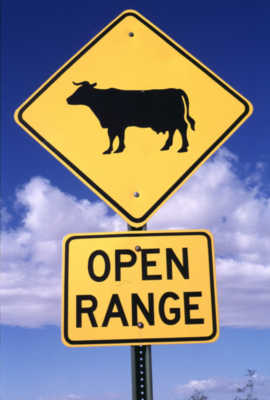 6. Stop climate change. “Hamburgers are the Hummers of food” when it comes to climate change, say scientists. Switching from steak to salad could cut as much carbon as leaving the car home a couple of days a week. Food is the third largest contributor to the average household’s carbon footprint after driving and utilities. If people simply cut their meat intake from the average 90 kg/year to 53 kg/yr, meat-associated carbon emissions would drop by 44 percent.
6. Stop climate change. “Hamburgers are the Hummers of food” when it comes to climate change, say scientists. Switching from steak to salad could cut as much carbon as leaving the car home a couple of days a week. Food is the third largest contributor to the average household’s carbon footprint after driving and utilities. If people simply cut their meat intake from the average 90 kg/year to 53 kg/yr, meat-associated carbon emissions would drop by 44 percent.
7. Be nice. Many livestock and dairy cattle are raised in cruel and inhumane conditions where they must be injected with antibiotics so they’ll fatten up and seem healthy. The Union of Concerned Scientists reports that about 70% of all antibiotics made in the U.S. are used to fatten up livestock.
8. Avoid drugs. In addition to hormones and antibiotics, conventional meat producers routinely process their products using chemical additives and preservatives like phosphates and sodium nitrites. That makes them pinker, but not necessarily healtheir. Sodium nitrites may react with amino acides to form carvinogenic nitrosamines; various studies have found a link between high processed-meat consumption and colon cancer, possibly attributable to prservatives like sodium nitrite.
9. Live longer. Speaking of health, eating a lot of meat can increase the likelihood of heart attacks and high blood pressure.
10. Save money. Meat is usually the most expensive item you put in your shopping cart. Buy less meat, and shift the savings to organic fruits and vegetables.
Here’s a good rundown on what it costs in water, energy and resources, to eat a hamburger (and fries) at a fast food restaurant.



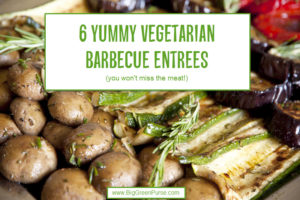
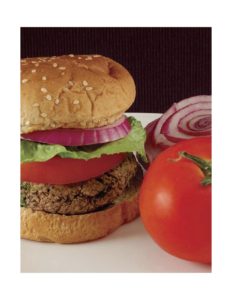

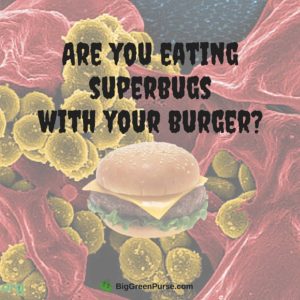
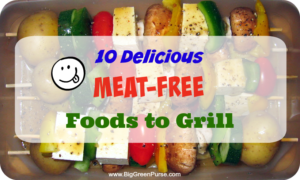
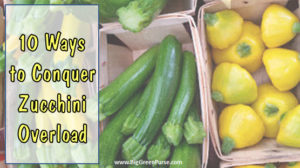



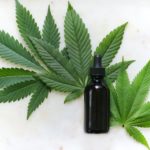
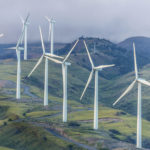
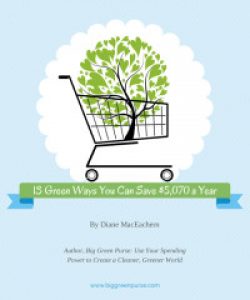


16 thoughts on “Ten reasons why you should eat less meat”
Excellent info…some of which I’ve been telling people for years! hopefully more will come around to vegetarian/vegan lifestyles.
May refer my DD’s teacher to point #5 especially since we just did a “report” on how it’s insane that we waste all that to feed to cattle/livestock/poultry rather than just feed people with those resources instead.
Excellent blog!
Hi Diane – Great post! You covered it all! Recently I wrote about ‘considering going veg at least once a week’ for some of the exact same reasons. Here is another interesting little fact I uncovered too: “2.2 lbs of beef is responsible for greenhouse gas emissions which have the same effect as the carbon dioxide released by an ordinary car traveling at 50 miles per hour for 155 miles”… how crazy is that? Thanks for all the additional info!
I never knew where that statistic about 70% antibiotics into feed came from …thanks
I couldn’t agree more, as I became a vegetarian in 1988 and turned vegan in 2004 – not only are my food bills substantially cheaper, but the health benefits are clear. Less colds and flu, better weight, better sleep, better skin.
Recently I started growing my own vegetables on my fifth floor balcony and blogging about it – the response has been very encouraging from other urbanites concerned with mass food production and spiralling costs. Not to mention that home-grown has better flavour and quality without all the nasty pesticides. As for meat – why put growth hormones in your body? Ick.
The most shocking thing to me was the colonic I had in 2006 – bearing in mind that at this point I hadn’t eaten meat in two decades – and there were *still* particles of meat in my system!
There are so many meat alternatives out there, not to mention beans and legumes, that making the transition is a lot more painless than say ten or fifteen years ago. I’d highly recommend it!
Great comments, all!
For those of you who can’t become completely vegan, just giving up meat a couple of times a week is a good next step. Or eat half as much at a time (I don’t eat meat, but my son does. If I make him a (free range, organic) burger, it’s on the small side. If I grill him a steak, I cut it in half and save the second portion for a meal the following day.). Also…start your new habits in the summer or fall, when there are more delicious fruits and vegetables to choose from.
A friend sent this, and I have to say your article is completely inaccurate.
1. It is not for grazing land that rain forests are being cleared. Don’t get me wrong, I do not support the practice, but farmers are clearing the land for produce, soy beans, semolina, coffee… Grazing land use is a very small %, and you can’t support your claim.
2. Waste power generators.
3. Far from manufactured drugs, the problem of e coli is much more serious. Humans pee out most drugs they take in, it is not just the cows.
4. Save water? Come on. 600 gallons for 1 burger? A $1 burger has a good cost of 33 cents. Are you trying to tell us that someone somewhere is getting a gallon of water for .05 cents? No one is getting a gallon of water for .05 cents. If you could do that you could solve the world’s water problems, irrigate the desert, and never have droughts again.
I could go on, but the whole article is clearly under researched.
I don’t think veganism makes sense on a health, ethical, or environmental level.
Health-wise – it may be possible to live a healthy life without any of the nutrients to be found in meat, but it is difficult, uncertain, and ignores many vital aspects to our biology. There are certain types of meats, raised in certain ways, that have loads of health benefits and little or no negative impact. We can be entirely healthy beings and eat nothing but meat.
Environmentally, this is a dubious claim as well. Factory farming is environmentally disastrous, but grass-raised livestock are a feasible aspect of a sustainable food culture. Why not take the two pounds of grain and produce more food with it? Because massive grain production isn’t sustainable, it contributes to a much greater carbon footprint through the global shipping of food products, and undercuts the ability of different global regions being able to support themselves agriculturally. That is, the land used in America to raise meat should NOT be seen as potential cropland that could feed people in India. Granted, Amazonian rainforests should not be seen as potential cropland to feed people in the U.S. either.
Moreover, veganism specifically limits people to quite narrow food choices, and often (although I recognize this isn’t necessary) the resort is to make a whole slew of products based of things like soy. This is environmentally harmful and dangerous, as it ignores the benefits and sense of diversification.
Ethically, it’s the abusive practices of factory farming that are morally repulsive, not the act of eating another animal. This is a natural process that sustains the earth. Furthermore, these particular animals – chickens, cows, sheep, etc, are animals that have specifically evolved, both naturally and through human selection, to exist as livestock. That is, their survival is intertwined with the fact that we eat them and have an interest in protecting them from other predation. Sans humans, and assuming we don’t regulate the number of predators or access they have to the animals, these species are being put at considerable existential risk.
I understand the allure of veganism and understand that for some people, it’s just what they are comfortable eating. But I think claiming that it is superior on any of these three levels is highly suspect.
best thing I have done in my life was to realize my personal impacts on the animal world and environment, open my eyes to the factory farming system, and stopped eating meat. many positive things resulted, the most profound being a higher spiritual ‘awakening’ or awareness.
Thanks for sharing your experience. I’m mostly a vegetarian myself, and never eat beef. Maybe we can support a “meatless Monday” campaign or something?
Thanks, Diane, for the awesome article and I completely agree with your sentiments. Since my awakening, I’ve eaten significantly less meat and processed food, while drinking a lot more water.
With your permission, I’d love to mirror this article on my website, with a link back to this page.
Thanks for your consideration and keep up the great work!
Hi, Gregg. You are welcome to mention my article on your website and link back to the original. Thanks for asking.
Wonderful information. I actually very much like number 1, It’s astounding that there are less and less remaining rainforest in the world today. Hopefully my kid gets to see it or whats left of it when he grows up. I sure do hope that rainforests will not be a thing of the past that they can only read in books in the future. Scary..
I hope your kids get to see the rainforest, too!
Well hello there! In this post did you use the data from any studies or these are totally your exclusive conclusions? Thanks in advance for your answer.
I wish I can be a vegetarian in an instant. But I can’t help eating meat especially nowadays.
Couldn’t you start with “meatless Mondays” and just cut back a bit? That’s the way to begin!